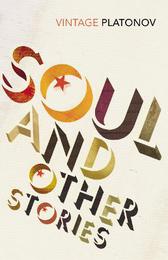
|
Soul
Paperback / softback
Main Details
Description
A man travels to the central Asian desert in order to bring his nomadic people into the Communist fold. This edition contains seven additional stories by Platonov. TRANSLATED AND WITH AN INTRODUCTION BY ROBERT AND ELIZABETH CHANDLER 'For the mind, everthing is in the future' Platonov once wrote; 'for the heart, everything is in the past'. The protagonist of Soul is a young man torn between these opposing desires, sent as a kind of missionary to bring the values of modern Russia to his childhood home town in Central Asia. In this strange, haunting novella, as well as in the seven stories that accompany it, a rediscovered master of twentieth century Russian literature is shown at his wisest and most humane. WITH AN AFTERWORD BY JOHN BERGER
Author Biography
Andrey Platonovich Platonov (1899-1951) was the son of a railway-worker. The eldest of eleven children, he began work at the age of thirteen, eventually becoming an engine-driver's assistant. He began publishing poems and articles in 1918, while studying engineering. Throughout much of the twenties Platonov worked as a land reclamation expert, draining swamps, digging wells and also building three small power stations. Between 1927 and 1932 he wrote his most politically controversial works, some of them first published in the Soviet Union only in the late 1980s. Other stories were published but subjected to vicious criticism. Stalin is reputed to have written "scum" in the margin of the story "For Future Use," and to have said to Fadeyev (later to be secretary of the Writers' Union), "Give him a good belting-for future use!" During the thirties Platonov made several public confessions of error but went on writing stories only marginally more acceptable to the authorities. His son was sent to the Gulag in 1938, aged fifteen; he was released three years later, only to die of the tuberculosis he had contracted there. From September 1942, after being recommended to the chief editor of Red Star by his friend Vasily Grossman, Platonov worked as a war correspondent and managed to publish several volumes of stories; after the war, however, he was again almost unable to publish. He died in 1951, of tuberculosis caught from his son. Happy Moscow, one of his finest short novels, was first published in 1991; a complete text of Soul was first published only in 1999; letters, notebook entries and unfinished stories continue to appear.
ReviewsI squint back on our century and I see six writers I think it will be remembered for.They are Marcel Proust, Franz Kafka, Robert Musil, William Faulkner, Andrey Platonov and Samuel Beckett...They are summits in the literary landscape of our century -- Joseph Brodsky Rarely does literature come this close to music * Observer * Soul towers above anything else I have read this year. Translated beautifully... It is dark, ascetic, innocent, humane and mystical -- George Szirtes * Irish Times * Andrey Platonov is the most exciting Russian writer to be rediscovered since the end of the Soviet Union. Born in 1899, one of a railway worker's 10 children, he was an engineer, a party member and a model proletarian writer before doubts about Communism, and his literary imagination, landed him in trouble with Stalin. His work stopped being published in the early 1930s and only resurfaced 40 years after his death in 1951...The Foundation Pit will stand out as his masterpiece * Independent * 'The Chandlers have brilliantly dealt with the challenges of rendering into readable English the extraordinary quality of Platonov's prose... Overall it is hard to see how we could get a better English version of Platonov's prose-nor one more likely to win him the readers he deserves' -- New York Review of Books * Orlando Figes *
|